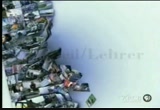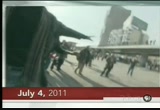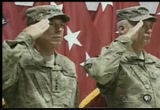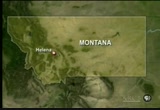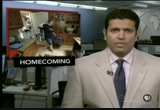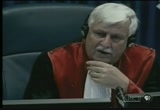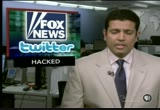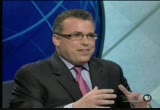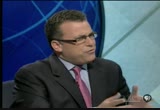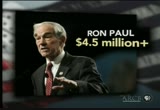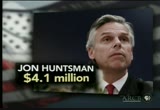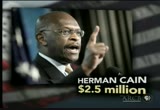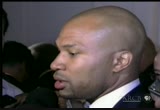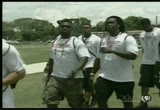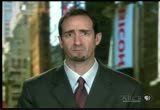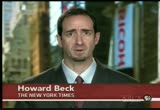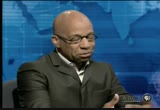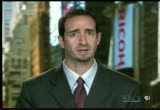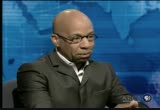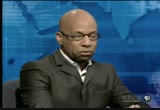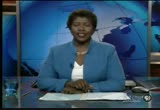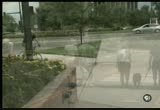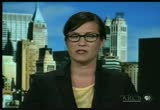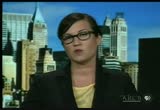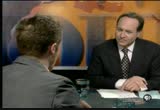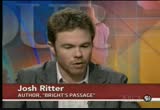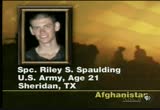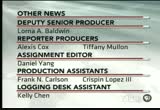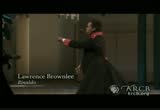tv PBS News Hour PBS July 4, 2011 5:30pm-6:30pm PDT
5:30 pm
captioning sponsored by macneil/lehrer productions >> ifill: americans here and abroad celebrated independence day today with parades, barbecues and fireworks. good evening, i'm gwen ifill. >> woodruff: and i'm judy woodruff. on the "newshour" tonight, we see how families, troops and presidential candidates alike observed the holiday. >> ifill: and as the politicians parade, political editor david chalian looks at how much money the g.o.p. field is raising toç challenge each other, and the sitting president. >> woodruff: we have the latest on both professional basketball and football lockouts with espn's kevin blackistone and the "new york times" howard beck. >> ifill: betty ann bowser has the story of two, classically- trained chefs giving public school lunches a healthy makeover. >> woodruff: margaret warner interviews lauren wolfe of the committee to protect journalists about the risks facing female
5:31 pm
reporters around the world. >> ifill: jeffrey brown talks to singer-songwriter josh ritter about his first novel.çç >> suddenly i was writing this novel. every day i would get up and i would write. it was just this great sense of freedom. none of the words had to rhyme. >> woodruff: plus, we get a behind-the-scenes peek at the capitol fourth, one of the nation's largest fireworks displays. >> ifill: that's all ahead on tonight's "newshour." major funding for the pbs newshour has been provided by: >> oil companies have changed my country. >> oil companies can make a difference. >> we have the chance to build the economy.çç >> create jobs, keep people healthy and improve schools. >> ... and our communities. >> in angola chevron helps train engineers, teachers and farmers; launch child's programs. >> it's not just good business. >> i'm hopeful about my country's future. >> it's my country's future.
5:32 pm
>> and by the bill and melinda gates foundation. dedicated to the idea that all people deserve the chance to live a healthy productive life. and with the ongoing support of these institutions and foundations. and... this program was made possible by the corporation for public broadcasting. and by contributions to your pbs station from viewers like you. thank you. >> woodruff: the united states marked its birthday today, the 235th anniversary of the signing of the declaration of fireworks, plus competitive eating, presidential campaigning, and a new teenager at the white house. the party started late last
5:33 pm
night-- midnight to be exact-- in gatlinburg, tennessee. the tiny mountain town kicked off the fourth of july in classic fashion with banners, music, and plenty of kids up past their bedtime. today, in cities across the country, preparations were underway for a robust celebration, unpacking fireworks and prepping the stages. )%jg.i].u:hpendence day host, >> woodruff: rehearsals in the nation's capital began yesterday with a run-through of tonight's festivities on the mall. celebrities hit the stage to polish their performances. >> it has been a long time dream of mine to play bluegrass on the capitol steps on the fourth of july, and tonight i feel i a one step closer to that dream. ♪ >> woodruff: tourists poured into washington this weekend, excited to see the show. >> to not go to the concert on the 4th of july in the capitol, i mean, you would have to be insane not@a< w9pá so
5:34 pm
absolutely. >> we've heard a lot of good stuff about it. it's fun, it's exciting, it's new for me and my family, never been here. >> woodruff: at the white house, crews worked to clean up last night's storm damage preparing the grounds for a barbecue and concert for military families-- a celebration coinciding with first daughter malia's 13th birthday. and at monticello-- the home of founding father thomas jefferson -- 77 immigrants from 44 countries were sworn in as american citizens. more2than 3,000 spectafors were on hand at the ceremony. >> my hope is that we can embrace our immigrant bothers and sisters and show them the best that is america. >> woodruff: summer travelers also flocked to philadelphia where the declaration of independence was signed. cindy richter from kentucky was there with her family. >> oh, it's phenomenal they can
5:35 pm
have an appreciation for where it all began and where our country began. >> woodruff: and in new york, contestants faced off inçç nathan's 96th annual fourth of july hot-dog eating contest, adding some pink, to the red, white, and blue. in the big apple and elsewhere, the day will end with the usual bursts of color, lighting the night sky-- a once-a-year moment, cherished by millions. but, in some places, this year, the sky will be silent. raging wildfires and dry weather in arizona, new mexico, and texas have forced authorities to cancel fourth of july fireworks in certain areas. >> a lot of people are going to be really disappointed, i thinkç >> woodruff: the patriotic spirit isn't felt only in the united states. these u.s. soldiers stationed in southeastern afghanistan held a flag raising ceremony to commemorate the 4th. and at kandahar airfield general david petraeus spent his last
5:36 pm
independence day as commander of u.s. and nato forces in afghanistan, with the troops. petraeus set to take up his new job as c.i.a. director later this year, today administered the oath of re-enlistment to 235 service members.çç >> you can really feel the honor, especially when you get a general like general petreas come down and do it for us. it makes it really feel a lot more important to me. it'll be nice being able to call home and tell my mom to check it out on tv and be able to tell my family that i got to do this. >> it's just an honor. it's an honor to serve our country. >> woodruff: back in the u.s., presidential candidates are capitalizing on the swell of patriotic spirit. >> happy birthday, america. >> woodruff: both former massachusetts governor mitt romney and former utah governorç john huntsman were in amherst, new hampshire, at a july 4th parade trying to connect with voters.
5:37 pm
minnesota congresswoman michele bachmann was at a clear lake, iowa, parade today as was former house speaker newt gingrich, while former senator rick santorum headed to two similar events in that state. and former godfather's pizza c.e.o. herman cain who was in iowa yesterday is starting his holiday off at independence hall in philadelphia, later traveling to new hampshire. >> ifill: still to come on the "newshour": those campaigningç presidential hopefuls launch their money race; both n.b.a. and n.f.l. players now locked out; healthier choices in school cafeterias; women journalists at risk around the world and singer songwriter josh ritter on his debut novel. but first, the other news of the day. here's hari sreenivasan. >> sreenivasan: a major clean-up effort was underway today in montana, after an oil spill spewed up to 42,000 gallons into the yellowstone river.
5:38 pm
the exxon mobil pipeline ruptured late friday near the town of laurel.çç since then, the oil has traveled about 100 miles east, near hysham. the oily residue has washed up on the riverbanks, but is still downstream from yellowstone national park. crews are laying sheets of absorbent pding and booms to prevent further damage. the president of exxon mobil said an investigation is underway. >> we do not know the root cause. this is a very unusual event. obviously, we had a large amount of oil enter the water very quickly, so whatever it is, it's very unusual for us, something we do not have our hands around yet but the investigating team certainly will work hard to determine that. >> sreenivasan: the u.s. department of transportation, which oversees pipelines recently notified exxon mobil of seven potential &efetyç violations along the ruptured pipeline. two of the warnings faulted the company for its emergency response and pipeline corrosion training. some 12,000 residents of los alamos, new mexico are returning home after the largest wildfire
5:39 pm
in that state's history. an evacuation order was lifted yesterday, now that the blaze is about 20% contained and no longer threatens the community. meanwhile, the los alamos national laboratory is set to re-open wednesday. but fire crews are still racing to protect sacred native american grounds that remain vulnerable. a violent crackdown on opposition intensified in central syria today. syrian forces opened fire onçç residents in hama and sealed off the city, three days after a massive anti-government protest there. this amateur video shows gunfire breaking out in the streets. approximately 20 people were wounded. activists also reported syrian troops fired on people fleeing to neighboring turkey. they say a mother and her young son were wounded. the winner of elections in thailand moved today to put together a ruling coalition with four smaller parties. yingluck shinawatra will become thailand's first female prime minister. she said her priority is to bring unity and reconciliation to thailand, after five years of turmoil following a militaryçç
5:40 pm
coup. today, the defense minister accepted her win, and vowed the military would not stage another coup. in morocco, thousands of protestors called for more electoral reforms this weekend just two days after voters approved a new constitution. the demonstrators were showing their support for the february 20 movement that aims for a parliamentary monarchy and to fight corruption. last friday, a referendum passed that would give executive power to the government, but keep the king in charge of the cabinet, army and judiciary. the former bosnian serb military chief ratko mladic was thrown out of his own court hearing today. u.n. judges ejected him from an arraignment at the hague afterç he shouted at the court in serbian, interrupted the judge and refused to enter any plea. he faces 11 charges of masterminding the worst atrocities of the bosnian war. >> ( translated ): i don't want to listen at all. without my lawyer i don't want to listen any more.
5:41 pm
>> ( translated ): mr. mladic, the court orders that you be removed from the courtroom. could security please escort mr. mladic out of the courtroom. >> ( translated ): you are not allowing me to defend myself!ç >> sreenivasan: after mladic left, the presiding judge entered not guilty pleas on his behalf. that's the rule of the war crime tribunal for suspects who refuse to enter a plea. mexican authorities announced the arrest of one of the co- founders of mexico's zetas drug cartel. jesus enrique rejon aguilar is also suspected in the killing of a u.s. customs agent in february. aguilar was one of mexico's most wanted men and the u.s. state department had offered a $5 million reward for information leading to his arrest. he was caught outside mexico city on sunday. the secret service will investigate the hacking of fox news' political twitter account. it was hacked early monday with six false postings reportingçç that president obama had been assassinated in iowa, and the shooter was unknown.
5:42 pm
fox news responded with a statement on its website calling the tweets malicious and false. those are some of the day's major stories. now, back to gwen. >> ifill: as we saw earlier, republican presidential contenders spent the july 4 holiday on the campaign trail. at least the parades got them out of doors. lately, most have spent their time feverishly dialing for the dollars they will need to support their campaigns. joining me now with an early look at the widely watched race for campaign cash is "newshour" political editor david chalian.ç so, david, so far we know that the g.o.p. candidates have raised a total of maybe $40 million. is that a lot, a little compared to what we've seen before. >> we haven't seen everyone's totals yet. we expect it to be right in that range. it's less, gwen, than we saw four years ago. the race started a little earlier four years ago at the end of the first fund-raising quarter in 2007 if you look at just the top three republican candidates, then john mccain, mitt romney, rudy giuliani, the three of them combined
5:43 pm
raised more than $50 million. i think we're seeingç lessç money being raised here for a couple of reasons. one, the economy just is not at the same place it was in 2007. the economy is in far worse shape. so big donors are not separating themselves from their cash quite as easily. i also think though you and i have talked about this. we've seen in those public opinion surveys of late that the republican electorate is not all that enthused about the republican field. so when they get asked time and again are you satisfied with these republican candidates, four years ago we saw a much higher level of satisfaction. >> ifill: remind me, other than bragging rights, why is it significant how much money you have at thisçç stage at ths early stage. >> a few reasons. one it's a brute show of strength. to say, hey, i've been able to raise the most. that's just an important marker to lay down but also because putting together a staff, building an organization and an infrastructure especially in those key early states but nationally across the country as well, that takes money. that takes money to build. so you need that. and then the third component
5:44 pm
is-- and this is especially for those that are less known candidates right now-- you want the ability to go up on the air on television to define yourself early before your opponents start to find you. you want to have that option. >> ifill: let's run through as many of these as we can get to. in in order whoç ruems like they've raised the most money so far, mitt romney who is considered to be the frontrunner. >> his campaign has been between million. big winner no doubt about that. but that's alarming for the romney folks. just a couple weeks ago somebody in their camp anonymously was quoted they were going to raise $40. he didn't best expectations but he raised more money when he was a lesser non-candidate four years ago. he raised $23 million four years ago. he's sort of behind his own pace. i think that's a bit of an alarm for him. what he's raised and the person who so far los as number two and that's ron paul the texas congressman. >> right. his campaign has raised at
5:45 pm
least $4.5 million. we haven't seen their numbers yet. it will be more than that. ron paul you remember he had a lot of fund raising success especially online four years ago. i think we will probably see that again this time around. most of his contributors will be small dollar donors. a lot of it will be coming from online. >> ifill: tim pawlenty the former governor of minnesota. >> most alarming report here. he's got $4.2jr&lionç that he raised for this quarter. but he's been working at it longer than anybody. he announced a little earlier than everyone. he's been working the donors for these three months. he had a poor debate performance. he didn'ter form all that well in that last iowa poll that came out about potential iowa caucus goers. this isn't a lot of money he raised especially compared to mitt romney at $15-$20 million. he has a lot to prove in august in iowa with the straw poll. if he can't show organizational strength there and have a good showing there i think his candidacy will be in serious trouble. >> ifill: if only to meet
5:46 pm
expectations. jon huntsmanç whoç hasn't been in the race very long comes in where. >> he's at $4.1 million but his campaign notes that about half of that came from his own pocket. he reached into his wealthy cofers and helped his campaign sport of get that seed money going. >> ifill: do we see a lot of that money coming out of people's own pockets. >> no. last time around mitt romney donated a lot of money to his campaign. he hasn't done any of that this time around. >> and tim pawlenty didn't meet expectations but we go somebody who has exceeded expectations perhaps because there weren'to)any. michele bachmann. >> they won't release their numbers until the july 15 dead line. we do know this. she has there 3 million in her congressional campaign account. that can roll over to a presidential campaign. for his last campaign for congress 2010 she raised $11 million, gwen. she is a proven prolific fund-raiser. >> herman cain the former pizza ceo he's actually
5:47 pm
raising some money. >> without a doubt. he has a little bit of a following dlchlt 2.5 million for this quarter. in 2007 joe biden the current vice president he raised $2.4 million less than herman cain >> ifill: for the record we do not know yet what the president has raiseded but we're expecting to see a big number. >> maybe around $60 million.>> k you so much. >> thank you. >> woodruff: now, h happening at the same time, two big labor disputes in the world of professional sports: both football and basketball. last month's n.b.a. finals between the dallas mavericks and the miami heat drew some of the best t.v. ratings in years. but the mavericks' celebration could be the last basketballçç fans see of their favorite pro players for quite some time. labor talks between players and owners broke down last week, and effective 12:01 am friday, the owners issued a lock out.
5:48 pm
n.b.a. commissioner david stern: >> i don't know that it went from there to here. we had a great year in terms of appreciation of our fans for our game. it just wasn't a profitable one for the owners and it wasn't one that many of the smaller market teams particularly enjoyed orçç felt included in. >> woodruff: at issue, owners want to set a firm limit on player salaries. share a smaller portion of the league's roughly $3.8 billion in annual revenue with the players and implement shorter player contracts. but with the october start of the 2011-2012 season now in jeopardy, player representative derek fisher said the goal is not to miss any games.çç >> any games at this point, still don't like the prospect of a lockout. we don't like it either. it's something our owners feel like it's the best way to get what they want.
5:49 pm
we don't agree. we're still going to continue to negotiate in the midst of this lockout. >> woodruff: meanwhile, pro football remained caught up in its own standoff. representatives of the national football league, players and owners continued negotiations in their four-month-old lockout last week, in minneapolis.çç the two main sticking points: money-- how to split up the nfl's annual revenue of roughly $9 billion. and the schedule-- the league wants to add two more regular season games, for a total of 18. the players say that increases their risk of injury and they deserve compensation. n.f.l. commissioner roger goodell and nfl players association executive director demaurice smith took time off to attend a rookie event in florida
5:50 pm
last week.mç >> we're taking a break because we felt is was important to be down here with the players. we have respect, obviously for the players and this is an important few days. and we're going to get back to work. >> woodruff: back in minneapolis on friday, smith said all sides had high hopes. >> we know it's important, our players want to play, our fans want to see the game that they love. >> woodruff: talks are scheduled to resume tomorrow, putting the end of that labor dispute already well past the 100-day mark ever closer to the pre- season, now scheduled just one month away.çç for more now on both the n.b.a. and n.f.l. lockouts, we're joined by howard beck, who covers professional basketball for the "new york times." and kevin blackistone, a professor of sports journalism at the university of maryland. he is a regular commentator on espn. thank you both for being here.
5:51 pm
kevin, do you first. let's talk about the newest dispute of the newer of the two, basketball. what's at the heart of this disagreement? >> well as always it's money. and the nba is crying poverty. they'll tell you that 22 of their 30 teams didn't make any money last year andç don'áç hae much prospects for making any money in the near future if the continued financial plan they're working under isn't broken up and something else is put in its place. ton the players obviously don't want to give anything back. that's the big difference between the nba and the nfl. the nba owners and management are actually asking concessions from their players. >> howard beck, what would you add to that? help us understand the divide between the owners and the players in basketball. >> well, it basically breaks down along two lines for the nba. there's the philosophical or the stuck toural side of thisçç which is that they want to impose this hard salary cap instead of the soft cap which has all kinds of exceptions that allow teams to go past
5:52 pm
the cap limit on payrolls and a hard cap which would be an all-time first for the nba, something that players have been fighting against for decades really, ever since the sort cap system went into place. there's the structural. the other side is just the straight financial division of the revenues which are near $4 billion. currently the players make about 57%. the owners are saying they want to ratchet it down to more of a 50-50 split. even within that it's a redefined revenueç kol that they want to split 50-50. what the players are saying is, look, over the course of ten years, which is the length of the agreement that the owners want by the end of it the players are saying they would actually be below 40% compared to where they are today. so there's really a huge divide on both of these issues right now. >> woodruff: howard beck, i was reading that the owners are saying most. teams right now are losing money. can they prove that and how big a factor is that? >> the nba has been very open with its books. this is one of the other differences between the two leagues. the nfl players association has been asking nfl owners for?
5:53 pm
some kind of transparency which the nfl has largely resisted. the nba owners say, hey, look we have presented our auditeded financials for all 30 teams. the playerss have seen the same numbers we've seen. it's become a debate over what is included. so, you know, the nba says it's been losing between 300-400 million a year. the players are saying, well, we can see that in the financials you've presented to us but we don't agree with everything that's in there. the players also have a kind of a principle at stake here which is that they don't believe it's their responsibility to bail out the owners especially those of small much market teams or badly run teams that maybe aren't making the best use of their resources or makinged bad decisions.ç >> woodruff: you're nodding your true. >> it's true. so much of this is reflective of what's going on in america. right now we're having, you know, 2011 is a record year for corporate prove is yet corporate america points to the economy as being in bad shape. they point to unions and workers as people who need to
5:54 pm
pitch in and help them save themselves. you're seeing the same thing going on in the sports world particularly the nfl model which is bringing in $9 billion-- $9 billion! not only that but they sent out an estimate that over the next ten years they expect to double that.çç yet they're in a fight with their players, the very people who they make their money off of, about howmuch of that revenue to share. >> woodruff: i want to get back to that in just a second but before we leave basketball, howard beck, what are the prospects and what are the consequences if they don't get it resolved? this is new. this whole thing just got underway a few days ago. >> yeah, it's the thing with these labor disputes in professional sports leagues is that urgency is everything. once they got to the lockout date, we're kind of in this limbo now where neither sideçç is going to feel much pain or much urgency until maybe around labor day, about and month before or a few weeks before nba training camps are set to open. we have been down this once
5:55 pm
before. the nba lost games a labor stoppage to a lockout once before in 1998. that dispute wasn't settled until january 6 of 1999 after they had gone for 204 days. they ended up putting together a short, compact 50-game season. they certainly lost in terms of attendance and revenues and fan interest. it did take them a couple of years to kind of get going again and bring all that interest back. they're coming off ayç fantastc season here. there is clearly some risk to the nba as a league and to the players too, of course. to shut this thing down. but we're still so far from missing games that it may take a while before we see whether or not they're going to get to that critical point. >> woodruff: kevin, let's switch over to the nfl now. you were talking about the money difference. the money is at the core of it but help us understand the difference between this dispute and the basketball dispute. >> well i think the dispute is, one, no one is crying poverty within the nfl. they just flat can't do that because they are the 800-pound gorilla when it comes toçç sports leagues. they just rake in more money
5:56 pm
and more money and more money. number two, the transparency issue that howard mentioned is a big deal. the nfl players association union has been pleading with the league to open up its books. the league has done everything it can to stay away from that. number three, the nfl players association has also decertifyed. so they've gone into the courts as a result to try and help fight their battle. that hasn't happened with the nba. i'm not so certain that it will. but one thing thatçó has done for the players' association in football, i think, is given them a lot of confidence because all of the early court battles they actually won. so i think now it's the owners in the nfl who had are backed into a corner trying to figure out how to respond. >> woodruff: can this be resolved if the owners don't open up their books. >> i think it can. already the players have backed off of their demand for about 53% of revenues down to
5:57 pm
about 48%. partly because they know that the expectations for revenues being earned over the next ten years are just so gargantuan. so i think it can be done. i think it will be done. i think in the nfl is a lot further aloég at get inning deal done and saving their season than the nba is. >> woodruff: quickly, there are reports they are close. is that your understanding, that this could get resolved? >> judy, i think they're only close because everybody realizes it's july now. this is when training camp starts. next monted is august. that's when the pre-season games begin. so i think now people are really starting to focus on it and starting to think, hey, let's get this deal done. i think because of that i think that's why we're closer. that's why the urgency is there now. >> woodruff: you have our attention. it certainly has the attention of all the fans. we thank you both.çç >> thank you.
5:58 pm
>> ifill: next, an encore look at a pair of chefs who want to change what kids eat. it's all part of a growing effort to tackle the problem of childhood obesity in schools. "newshour" health correspondent betty ann bowser has this report on a boot camp for public school cooks in colorado. >> we talked about the mother sauces yesterday. hollandaise. what does it go over? >> she knows herç wayç arounda hollandaise sauce. >> what happens is called blooming. the flavor gets bigger and bigger and bigger. >> reporter: and kate knows the subtleties of spices. between the two of them, chef andrea and chef kate have cooked their way through enough beef wellington to merit their own show on the food network. but these days the two classically trained chefs from new york city have chosen a far more mundane place to show case their talent. they're taking their culinary knowledge on the road to the
5:59 pm
public schoolçç lunchrooms of america. and the people who prepare food for the kids who eat there. and here's one of the reasons why. >> the centers for disease control says that one-third to one-half of our children born since the year 2000 will acquire type 2 diabetes in their lifetime because the cdc says that this is the first generation in american history have a shorter life expectancy than their parents because of diet-related illness. >> reporter: they ran a boot camp for chefs at a high school in colorado just outside of denver. it was just one of a series putç onç around the state sponsored in part by the colorado department of health and the colorado health foundation. the goal? improve the nutrition in public school lunchrooms. the centers for disease control say the mile-high state is the leanest in the country. but recent studies have shown that even here in healthy colorado obesity is a growing
6:00 pm
problem among black and hispanic children. eric arco is in charge of nutrition programs for the state health department. >> when you're looking at all of the data such as poverty and lack of access to fresh fruits and vegetables, lackç of access to outdoor recreation and parks and that sort of thing, we have rates that are just as bad as some parts of the south. >> reporter: many school children come from poor families whose income is so low they qualify for the federal free breakfast and lunch program. that means two of their meals each day are eaten at school. >> pan-frying, we're talking about the fat coming halfway up the item. are these techniques we're going to be thinking about for our schools? absolutely not. we don't do this in our schools. >> reporter: boot camp chefs npdeep frying and processed foods. the emphasis here is on cooking fresh food from scratch.
6:01 pm
recipes include those for yellow squash, call flower and lentals. >> the issue is not the kids won't eat it. the issue is the adults think the kids won't eat it. it's almost universal that we see the kids really do eat it. >> reporter: are these kids going to eat squash, cally flower, lentils? >> i think the idea of exposing them to it. >> reporter: lisa samuel cooks for kids in an elementary s!ool. she's big on one of the boot camps' important concepts called.... >> we learn how to disguise some of the fruits and the vegetables in the foods. >> reporter: what's the best trick you learn. >> how to make a spaghetti sauce and put carrots and celery and onions and zucchini. we blend it up and it's still fabulous red sauce. >> why is it important to have the language of the kitchen in your lifes. >> reporter: the boot camp chefs get instructions similar to what's taught in top
6:02 pm
professional cooking schools. language. we move into knife skills. we give them french terms to understand what they're actually doing. we basic cooking techniques with them. we put them in their chef whites. we had kids walk by the classroom the other day and said look at all the chefs in the room. we start to give them a sense of identity. >> reporter: as a school cook for 26 years, january... janice adams has watched with alarm as her students' waistlines have expanded. now she wants to bring a change to her lunchroom. >> we have toç beç careful abt what we're putting in our bodies and what the kids are getting in their bodies. these kids will have to take care of us some day. if we don't watch what we're putting into them, how can we take care... they take care of us. >> shannon has just lost over 100 pounds. she's also the mother of five children. inspired after her week at boot camp. >> i feel very empowered.
6:03 pm
i want to bring my education to the kids. that's where my heart and my passion is. i want to bring the education, five-star restaurants are great. i love the chef learning iw3 have right now. but impacting the lives of our children and bringing that to our school district, it's the most important thing to me right now in my life. >> shannon solomon! >> reporter: graduation day. each new chef left with a framed diploma and a whole new framework for school food. and now they might just have a chance to make lent ill and caulflower staples on the lunchroom menu. >> woodruff: now, a report sheds new light on sexual attacks on journalists working overseas. margaret warner has that. >> warner: the attack on broadcast journalist lara logan in egypt's tahrir square
6:04 pm
earlier this year brought to light a subject rarely discussed. . sexual assault and harassment of journalists in other countries. now a recent report, spurred in part by that attack, is opening a bigger window on that the problem. it's titled the silencing crime. it comes from the group the committee toçç protect journalists. the report is baseded on accounts by more than four dozen journalists, mostly women. they told of their experiences ranging from rapes and other sexual assaults to harassment and threats. 27 were local reporters in the middle east, south asia, africa and the americas. 25 were international correspondents assigned overseas. lauren wolf is the senior editor who wrote the report. she joins me now. lauren, thanks for being with us. you heard some pretty horrific stories from some of these women. give us an idea of the range. >> içç really did hear some terrible stories. they ranged from gang rape to
6:05 pm
street harassment, groping, to sexual assaults while women were in captivity or men were abducted. >> warner: your report identified different sorts of violations. one of the most sinister really seemed to be sexual attacks of some nature targeted at specific journalists. tell us about that. >> well, i think everyone heard about what happened to lara logan. that fortunaty really brought this topicçó to light. people haven't heard of a columbian reporter who was gang raped 11 years ago when she was reporting on right wing para military in the jungles of colombia. she was kidnapped, raped and her story came to light because it was so brutal that, you know, she pressed charges but nothing has ever been done in her case. 11 years later she's still fighting for justice. >> warner: did they know who they were going after? i mean, was it a form of
6:06 pm
reprisal or intimidation? >> it was absolutely targeting. she was reporting on something that they didn't want reported on. i saw the same thing happenç to a west african journalist. i can't identify her by name. jean is one of the very few women who has ever put her name to her case. this woman in west africa was reporting on rebel soldiers. again she was reporting on a topic that they didn't want covered. they brutally gang raped her. the men were actually shot and killed right in front of her. >> warner: in other cases you found just the threat of sexual attack was used. >> in fact, in a number of countries i've spoken to women who say we're calling in to report... in ivoryç coastç, fr instance, her boss was in a stadium during an uprising. as she was reporting to him, they were reporting back and forth, a man came over, picked up the phone and told her she
6:07 pm
would be raped if she didn't get off the phone. the man continued to call her for ten days after that. i spoke to a person in egypt whose father received calls for two weeks saying she would be be raped if she kept blogging. >> warner: you found otherçç risky situations, dangerous ones, crowds or captivity. >> um-hum. when people talk about crowds, i mean, i think people think of groping, maybe it's just a little touching or grabbing. but the journalists i spoke to mostly foreign correspondents in this case, told me about having their crotchs grabbed about really being molesd while they were in crowd situations. these are really volatile areas where women usually aren't found, say, suicide bombings for instance. i spoke to one photojournalist who told me she was bending over photographing a severd that kind of violence was extremely common with i think it was 23 out of 25 of the
6:08 pm
women of international female reporters i spoke to saying that he this had been repeatedly groped. the other kind of assault that you're talking about is in captivity. that's happened, for instance, in pakistan with a man named umar, a columnist, who was abducted and sexually assaulted. he was sodomized in retribution for his writing. >> warner: a lot of these victims at least the women, have never told their stories before to anyoee other than friends or family. why not? >> there are a number of reasons. the biggest one i heard from international correspondents was the fear of losing assignments. i have spoken to at least two journalists that told me that they were taken off assignments specifically because they came forward to talk about their sexual assault. so really does happen. they don't want to be appear to be weak or vulnerable. women told me repeatedly that they had worked very hard to overcome this sense that they
6:09 pm
were the weaker gender in this profession and that them didn't feel that they could reveal that they had been raped without it making them look somehow more vulnerable.çç there are also.... >> warner: what about the local reporters? what were usually their reason for not saying anything? >> a lot of different cultural stigmas. say, in afghanistan, there are honor killings. i talked to a journalists who couldn't talk about the attempted rape that was perpetrated by her superior because she knew of two colleagues who had been killed by their own families for talking about having been raped. so there are honor killings. there are many countries in which women can't marry after they've been raped. there's just simple gossipçç. their also the fear that there will be no justice brought in a lot of conflict zones. there are no working police departments, justice systems so there's really no point in coming forward in a lot of these cases for these
6:10 pm
journalists. >> warner: why did you and why the committee to protect journalists decide it was important to publicize this now? >> it's really a freedom issue that no one has been talking about. i think we cover things from attacks to murders to jailings of journalists. these are all things that prevent reporters from gettingtç and from having the news heard. this is just another way of preventing men and women across the world from telling the news. i think lara logan really broke down the wall, and a lot of women are very grateful to her and so are a lot of men. i think the journalism profession as a whole has woken up and realized it's time to acknowledge that journalists don't need to go through this needlessly. >> warner: what are you planning to do with this other than release this report? >> well, one thing we've done already is produce açç securiy guide section about sexual assault. we've been talking to different news rooms about what kinds of security training that they're working on with their journalists.
6:11 pm
for instance, nbc has said they're implementing sexual assault training specifically for journalists who are going to go into the field. we also plan now that we have more information on what's going on with sexual assault and journalists to really advocate for fully for those journalists. you know, hopefully bring some justice in these cases. >> warner: do you think news organizations need to do more tç helpç women protect themselves? >> i think preparation is never a bad thing. i think that journalists are often going out there without a sense of what to do if they're sexually assaulted. they also don't necessarily have the sense that they can come back home and tell their managers what's happened to them without fear of retribution. >> warner: lawrence wolf of the committee to protect journalists, thanks very much. >> thank you. >> ifill: next, a musician turned novelist.
6:12 pm
jeffrey brown talks with josh ritter about his debut work of fiction. >> brown: henry bright is a 20-year-old young man just returned home to west virginia after serving in world war i when his life is turned further upsidedown. his wife dies in childbirth and henry, instructed by an angel, escapes into the wilderness with his newçç born son to flee an approaching wild fire. so begin a debut novel by a man better known for his work in another art form singer songwriter josh ritter. his most recent album go runs the world away came out last year and josh ritter joins me now. >> thank you for having me. >> brown: why a novel? people know you for your music. why this? >> i always thought as a songwriter that what a songwriter does is build sort of a hallway. you're building a hallway for people to travel down. they walk down the hallway. then at a certain point they decide toç walk through a door to the right or left.
6:13 pm
they go into their own mind and own kind of refuse re. i was interested with bright's passage which began as a song. >> brown: it did begin as a song? >> yeah, yeah. i decided i wanted to travel down that hallway and go through one of those doors and just sort of see what was beyond. >> brown: you go through the door usually and it's a three or four minutes song. this bomes a couple hundred page novel. >> yes. that's right. it started off as a song but it was a very, very... it was about a guy who gets periodic instructions from an angel. i thought, well, this song is cool. but i want to see what else happen. i hadçç the whole plot here in my song. and then by the second page, there was an angel talking out of a horse. everything went awry. >> brown: before we get to the angel and the horse, tell me a little bit more about this character, henry bright. the book goes back and forth between his time, past and present, in west virginia, and his time fighting in europe in world war i. >> yes. henry bright was a character that i had in my mind. i mostly just saw his eyes.
6:14 pm
i thought he had the look in his eye ofçç somebody who was trying to put together a jigsaw puzzle on his own, you know, and just looking for a pattern somewhere. the idea of kind of a sweet, normal man going from west virginia and suddenly arriving in the absolute downpour and hailstorm of the first world war and then having to come back home to auiet life was something that really struck a cord with me. i feel like maybe it strikes a cord with, you know, with... with theçç times today. >> brown: so there is the hard realism of war. which you address. and then there are the angels. there's the angel and the talking horse. >> yeah, yeah. >> brown: it's an interesting balance. i mean, i know from talking to a lot of writers it's hard to get that right, that kind of magic suddenly and fantasy thrown in to hard reality. was it hard for you to balance? >> being the absurd kind of canvas it is already, it
6:15 pm
seemed almostç toç broaden the doorway for something like an angel to kind of come into the picture. you know, with the... at the beginning of the first world war there were horses. at the end tlferp airplanes... at the end there were airplanes and poison gas and a whole new countries were created. i think a lot of people were wondering what was the role of heaven in all of this. if there was some sort of divine plan of any kind, you know, what was it? i thought that the angelçç was important because angels always seem to come in with a great deal of conviction. they always seem to know exactly what's going on. but rarely do the events that come after make a whole lot of sense. >> brown: for the reader, i mean it's a question of, i don't want to give too much away here. the question i guess i had was this sort of magical realism that there's actually an angel or a mental derangement. after all, he's been through
6:16 pm
war. >> i think that's... to me, that's a questionçç that i really loved. loved the tension. i don't know if he is or not. whatever it is, if it's real or if it's some kind of a manifestation of a brokenness that henry bright has kind of sustained in the war, it's something that i really was interested in looking at. the one thing i want... i felt a great deal of empathy for him as a person. i wanted whatever questions he was asking, no matter if he[ç was in the woods talking to a horse or in the woods talking to kind of his own soul or his own conscience, i wanted him to be... to be a sort of empathy and make sure that he was never a source of ridicule. >> brown: and when you went to work in this longer form, was it hard? was it surprising for you to tackle? >> yeah. in some ways it really was.
6:17 pm
but in other ways it was a tremendous... there was a tremendous sense of freedom. you know, i hadç finishqf working on songs for my last record. and i was about to go on tour. and suddenly i was writing this novel. every day i would get up and i would write. i would write for about an hour. it was just this great sense of freedom. none of the words had to rhyme, you know. that was a great thing. and i wrote, you know, i wrote the first draft in about two months. then as time went on and over the next year or so when i was editing, i began to see how much like song writing it is. every single word is so important. it's like a balance beam. you're walking along, you know, a several-year tight rope. hoping that you never fall off and hoping that you, you know, you're taking the right chances. >> brown: what's next? you're still making music, of course. are there more novels to come. >> definitely.
6:18 pm
i love writing songs. i love playing shows. it's the joy of my life. but i feel like, a little bit like, iç feel like a little bit like a horse that is standing in field and looks up and sees another field over there and i kind of want to go over there sometimes. i feel really lucky for th realization, yeah. >> brown: all right. this novel is called bright's passage. josh ritter thanks. >> thank you very much for having me. >> woodruff: finally tonight, we take a look at what makes some fourth of july celebrations so explosive.çç ♪ >> i'm tom stiner. and i work with pyro shows-- this great company in tennessee that for the ninth year in a row has been awarded the honor to come here and salute the nation with a terrific fireworks show.
6:19 pm
if it has a theme, you start with a theme and then you select the music if it's going to be a choreographed show.oç ♪ this show, the theme is undivided we stand in honor of the 10th anniversary of 9/11. in any patriotic show you'll have a lot of red, white, and blue. in this show you'll have just a lot of "we love america."ó[ we have ten-inch shells, eight- most of the fireworks come from china for all companies. we get some fireworks from italy and some fireworks from spain to achieve the best color. and we buy the fireworks that are traditionally proved and loved and then we'll take all of the new ones we can get to stay up with the technology as well.
6:20 pm
there is an awful lot of physics and a lot of chemistry and a lot of science in fireworks evençç though they're produced in the most rudimentary manner-- by human hands. a very laborious process where they take the cardboard, mold it into something that they can put the powder and the filler in and wrap it in wet paper like paper mache. fireworks is a tradition that's we have ten-inch shells, eight- inch shells and six inch shells. all of them are required to break above the washington monument which is 500 feet tall as we all know.çç so the smallest shell we can use here is a six-inch shell. and that in most shows is the largest one we'll use. the six-inch shell will go up 600 feet and will break a pattern at least 600 feet in diameter. we're setting this show up on each side of the reflecting pool. we drop the shell in then we put
6:21 pm
plastic over it to water proof it, then we put aluminum foil over it to fireproof it. once it's in the tube, it's perfectly safe and impervious from elemental harm as well asç accidental or intentional attempts to make it do what we don't want it to do. then you run a string of wires through a series of junction boxes, 26 pair of cable to a firing board, where a pyro- technician on the night of the show will stand and flip a switch which will launch a certain number of shells. for instance, at the opening, the first switch we press on cue one will launch 26 shells.çç fireworks is a tradition that's probably as old as any tradition in this country. john adams' letter to abigail on the second or third of july 1776 said that this was going to be
6:22 pm
the most significant day in this nation's history and it ought to be celebrated by pomp and circumstance and celebrations and parties and illuminations and fireworks from one shore to this day forward. so it goes way back. and it not only exists and persists, but grows every year. it's part of us. >> ifill: again, the major developments of the day: president obama thanked military families at the white house today for theirçç servie telling them the fourth of july is possible because of what they do. a major clean-up effort was underway in montana after an o a major clean-up effort was underway in montana, after an oil spill spewed up to 42,000 gallons into the yellowstone river.
6:23 pm
and security forces in syria opened fire on residents in hama and sealed off the city. there were also reports they fired on people trying to flee to turkey. and to hari sreenivasan for what's on the "newshour" online. hari? >> sreenivasan: watch josh ritter read from his new novel and peorm his song "girl in the war" on art beat. and there's more on the weekend's election in thailand. will a new leader help bridge deep political divisions? that's on our world page. plus on this fourth of july, our founding father george washington and how many of them still puzzle medical science today. all that and more is on our web site: newshour.pbs.org. >> woodruff: and again to our honor roll of american service personnel killed in the iraq and afghanistan conflicts. we add them as their deaths are made official and photographs become available. here, in silence, are eight more. çççç
6:24 pm
6:25 pm
we'll see you online and again here tomorrow evening. thank you and good night. major funding for the pbs newshour has been provided by: ç and by the alfred p. sloan foundation. supporting science, technology, and improved economic performance and financial literacy in the 21st century. and with the ongoing support of these institutions and foundations. and... this program was made possible by the corporation for public broadcasting. and by contributions to your pbs station from viewers like you. thank you. ó[ captioning sponsored by macneil/lehrer productions captioned by media access group at wgbh access.wgbh.org
516 Views
IN COLLECTIONS
KRCB (PBS) Television Archive
Television Archive  Television Archive News Search Service
Television Archive News Search Service 
Uploaded by TV Archive on

 Live Music Archive
Live Music Archive Librivox Free Audio
Librivox Free Audio Metropolitan Museum
Metropolitan Museum Cleveland Museum of Art
Cleveland Museum of Art Internet Arcade
Internet Arcade Console Living Room
Console Living Room Books to Borrow
Books to Borrow Open Library
Open Library TV News
TV News Understanding 9/11
Understanding 9/11